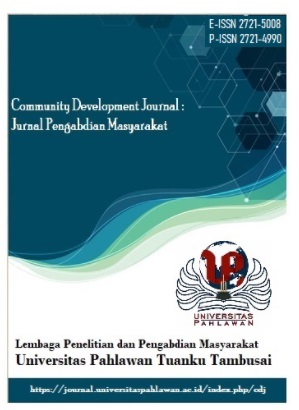READING REVOLUTION: ANALYZING THE EFFECTIVENESS OF COOPERATIVE SCRIPT TECHNIQUES IN STUDENT LITERACY DEVELOPMENT
DOI:
https://doi.org/10.31004/jrpp.v7i4.33789Keywords:
Metode Cooperative Script, Keterampilan Membaca.Abstract
Penelitian ini menyelidiki dampak metode Cooperative Script terhadap keterampilan membaca siswa kelas sembilan di SMPN 2 Labuhan Haji untuk tahun ajaran 2024/2025. Menggunakan desain kuasi-eksperimental, 70 siswa dibagi menjadi kelompok eksperimen dan kelompok kontrol. Kelompok eksperimen menerima intervensi Cooperative Script, sementara kelompok kontrol mengikuti metode pengajaran standar. Hasil pre-test dan post-test menunjukkan peningkatan signifikan pada kelompok eksperimen, dengan skor rata-rata naik dari 56,14 menjadi 64,57, dibandingkan dengan peningkatan skor kelompok kontrol dari 48,00 menjadi 53,43. Uji t sampel berpasangan mengonfirmasi bahwa perbaikan kelompok eksperimen (selisih rata-rata 8,43, p = 0,000) signifikan secara statistik, sedangkan perbaikan kelompok kontrol (selisih rata-rata -5,43, p = 0,000) juga signifikan tetapi kurang mencolok. Hasil ini menunjukkan bahwa metode Cooperative Script secara signifikan meningkatkan keterampilan membaca lebih efektif dibandingkan metode tradisional. Penelitian ini mendukung penggunaan strategi pembelajaran kolaboratif dalam pendidikan dan menyarankan penelitian lebih lanjut mengenai manfaat jangka panjang dan penerapannya yang lebih luas.References
Darong, H. C. (2022). Local-culture-based materials in online cooperative learning: Improving reading achievement in Indonesian context. Journal of Innovation in Educational and Cultural Research, 3(3), 361-372. https://doi.org/10.46843/jiecr.v3i3.113
Fischer, F., Kollar, I., Stegmann, K., & Wecker, C. (2013). Toward a script theory of guidance in computer-supported collaborative learning. Educational psychologist, 48(1), 56-66. https://doi.org/10.1080/00461520.2012.748005
Harvey, S., & Goudvis, A. (2007). Strategies that work: Teaching comprehension for understanding and engagement. Stenhouse publishers.
Lee, Y. H. (2018). Scripting to enhance university students’ critical thinking in flipped learning: implications of the delayed effect on science reading literacy. Interactive Learning Environments, 26(5), 569-582. https://doi.org/10.1016/j.compedu.2015.05.004
Lovett, M. W., Frijters, J. C., Steinbach, K. A., Sevcik, R. A., & Morris, R. D. (2021). Effective intervention for adolescents with reading disabilities: Combining reading and motivational remediation to improve outcomes. Journal of Educational Psychology, 113(4), 656. https://psycnet.apa.org/doi/10.1037/edu0000639
Massler, U., Müller, W., Iurgel, I., Haake, S., Gantikow, A., & Hadzilacos, T. (2022). Meaningful, gamified training of reading fluency. Frontiers in Computer Science, 4, 968137. https://doi.org/10.3389/fcomp.2022.968137
Ramirez, H. J. M. (2021). Facilitating Computer-Supported Collaborative Learning with Question-Asking Scripting Activity and its Effects on Students’ Conceptual Understanding and Critical Thinking in Science. International Journal of Innovation in Science and Mathematics Education, 29(1). https://doi.org/10.30722/IJISME.29.01.003
Sparapani, N., Solari, E., Towers, L., McIntyre, N., Henry, A., & Zajic, M. (2020). Secondary analysis of reading-based activities utilizing a scripted language approach: evaluating interactions between students with autism and their interventionists. Journal of Speech, Language, and Hearing Research, 63(9), 3130-3154. https://doi.org/10.1044/2020_JSLHR-19-00146
Spörer, N., Brunstein, J. C., & Kieschke, U. L. F. (2009). Improving students' reading comprehension skills: Effects of strategy instruction and reciprocal teaching. Learning and instruction, 19(3), 272-286. https://doi.org/10.1016/j.learninstruc.2008.05.003
Webb, N. M. (2009). The teacher's role in promoting collaborative dialogue in the classroom. British Journal of Educational Psychology, 79(1), 1-28. https://doi.org/10.1348/000709908X380772
Downloads
Published
How to Cite
Issue
Section
License
Copyright (c) 2024 Zulkarnaen Huda, Muhammad Husnu, Ahmad Yusri, Zuhratul Fikni

This work is licensed under a Creative Commons Attribution-ShareAlike 4.0 International License.






